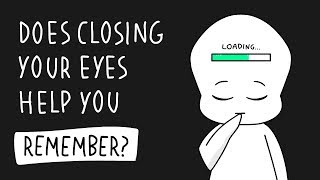Closing your eyes helps you remember things. An article written by psychology today titled 'Why do you close your eyes to remember'
闭上眼睛帮助你回忆。心理学家写了一篇名为《为什么闭上眼睛能帮助回忆》的文章
This is a very good job explaining why closing your eyes helps you remember things better.
这篇文章很好的解释了为什么闭眼能够帮助更好的进行回忆。
It says that closing your eyes prevents you from distractions that occupy your visual senses.
文章写道闭上眼睛将你和那些占用视觉的干扰分离开来。
It seems that your brains have a limited capacity when it comes to processing information related to specific senses.
似乎在处理感官相关的信息时,你的大脑容量有限。
For example, you are only able to process so much visual information at once.
例如,你一次只能处理一定量的视觉信息。
When you ask somebody to recall a visual object, chances are they're going to close their eyes or look up. This helps minimalize visual distractions.
当你让别人回忆一个视觉对象时,他们很可能会闭上眼睛或仰望。这能够帮助将视觉干扰最小化。
It also appears that depending on what we're trying to remember---sound, sight, smell, taste or touch. Closing off distractions to those senses helps you remember better.
似乎这还取决于我们回忆的是什么,声音、景象、气味、味道还是触感。关闭相应感官的干扰能帮助你更好的回忆。
We already use vision as an example.
我们已经有了利用视觉的例子。
For sound, the article also touches upon a study that shows that blocking out sound-related distractions when trying to remember a sound helps improve a call.
对于声音,这篇文章也提到一项研究,表明当在回忆声音的时候,封闭听觉相关的干扰能够帮助回想。
At this point, this logic seems to make sense and perhaps truly applies to the other senses as well.
在这一点上,这个逻辑似乎有道理,或许也能应用于其他感觉。
I also remember as a part of a memory lab that I volunteered for my supervisor had me research a little about memory and sensory processing,
我还记得在实验室里,我的导师让我做关于记忆和感觉处理的研究,

I forgot the name of the concept of the model but it basically says that when you multitask, you aren't actually multitasking.
我忘记了这个概念模型的名字,但是其大致是说,当你执行多重任务时,你其实并不是在处理多重任务。
You are essentially dividing up your attention or resources to various tasks. This also means that when you multitask, your attention on each task aren't at their 100%.
你其实是将你的注意力或资源分配给了各个任务。这也意味着当你在处理多种任务时,你在每个任务上的注意力并不是100%。
It supports the idea that our brains has a limited capacity when it comes to dealing with various senses.
这就论证了,当处理各种感官时,我们的大脑容量有限。
Another key point of the model was that if you perform two tasks that require the same sensory input and output, you're more likely to divide up the resources for those activities.
这个模型的另一个关键点是如果是在执行两项需要同样感官输入和输出的任务时,你更有可能给这些活动分配资源。
You're also more likely to have difficulties performing two or more tasks that require the same sense.
同时很可能同时处理需要相同感官的多种任务时会更加困难。
What are your thoughts on this article? Do you have any strange stories regarding remembering things or multitasking? Let us know in the comments below.
你觉得这篇文章怎么样?关于回忆或多重任务,你有什么奇怪的故事吗?请在评论中告诉我们。
If you like this video check out our other social media for more content and don't forget to subscribe. Thanks for watching
如果喜欢本期视频,请登录其他社交媒体观看更多内容,不要忘记订阅。感谢收看。












